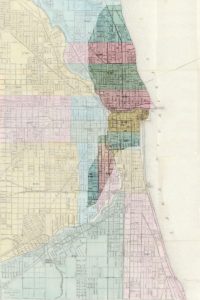Good morning, Whitewater.
Saturday in town looks to be lovely, with sunny skies and a high of fifty-nine. Sunrise is 7:01 AM and sunset 6:22 PM, for 11h 20m 46s of daytime. The moon is a waxing crescent with 45.3% of its visible disk illuminated.
On this day in 1871, the Great Chicago Fire begins:
1868 map of Chicago, highlighting the area destroyed by the fire (location of O’Leary’s barn indicated by red dot).
The Great Chicago Fire was a conflagration that burned from Sunday, October 8, to early Tuesday, October 10, 1871. The fire killed up to 300 people, destroyed roughly 3.3 square miles (9 km2) of Chicago, Illinois, and left more than 100,000 residents homeless.[1]
….The fire started at about 9:00 p.m. on October 8, in or around a small barn belonging to the O’Leary family that bordered the alley behind 137 DeKoven Street.[2] The shed next to the barn was the first building to be consumed by the fire, but city officials never determined the exact cause of the blaze.[3] There has, however, been much speculation over the years. The most popular tale blames Mrs. O’Leary’s cow, who allegedly knocked over a lantern; others state that a group of men were gambling inside the barn and knocked over a lantern. Still other speculation suggests that the blaze was related to other fires in the Midwest that day.
The fire’s spread was aided by the city’s use of wood as the predominant building material in a style called balloon frame; a drought before the fire; and strong southwest winds that carried flying embers toward the heart of the city. More than two thirds of the structures in Chicago at the time of the fire were made entirely of wood. Most houses and buildings were topped with highly flammable tar or shingle roofs. All the city’s sidewalks and many roads were made of wood.[4] Compounding this problem, Chicago had only received an inch (2.54 cm) of rain from July 4 to October 9 causing severe drought conditions.[5]
In 1871, the Chicago Fire Department had 185 firefighters with just 17 horse-drawn steam engines to protect the entire city.[6] The initial response by the fire department was quick, but due to an error by the watchman, Matthias Schaffer, the firefighters were sent to the wrong place, allowing the fire to grow unchecked.[6] An alarm sent from the area near the fire also failed to register at the courthouse where the fire watchmen were. Also, the firefighters were tired from having fought numerous small fires and one large fire in the week before.[7] These factors combined to turn a small barn fire into a conflagration.
On the same date, a fire in Wisconsin devastates Peshtigo:
1871 – Peshtigo Fire
On this date Peshtigo, Wisconsin was devastated by a fire which took 1,200 lives. The fire caused over $2 million in damages and destroyed 1.25 million acres of forest. This was the greatest human loss due to fire in the history of the United States. The Peshtigo Fire was overshadowed by the Great Chicago fire which occured on the same day, killing 250 people and lasting three days. While the Chicago fire is said to have started by a cow kicking over a lantern, it is uncertain how the Peshtigo fire began. [Source:Wisconsin Magazine of History]

